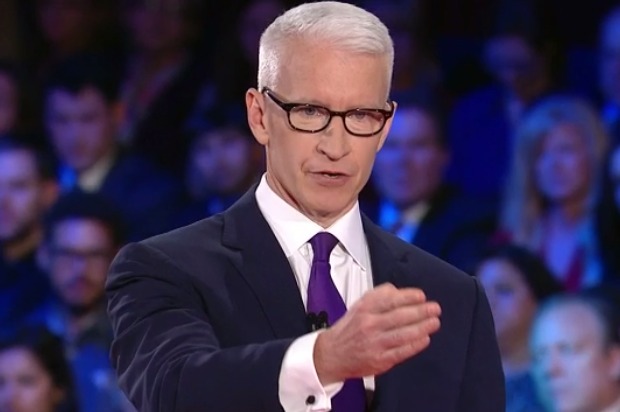It was hard to tell what was more on point last night: Anderson Cooper’s look or Anderson Cooper’s questions. The look was, let’s face it, impeccable: Whatever personal reservations you might have with hipster glasses, CNN anchor and moderator of last night’s Democratic primary debate Cooper pulled them off with aplomb, along a devastatingly tailored dark suit and a purple—purple!—necktie. It might seem reductive to talk about fashion, but look, this is a televised debate; we all know John F. Kennedy seduced America by looking really good. In fact, the candidates’ outfits rather reflected their performances last night: Secretary Hillary Clinton was sleek and impeccable; Senator Bernie Sanders was put-together, slightly rumpled, and thoroughly on-brand. Governor Lincoln Chafee was ill-fitting, mismatched, and out-of-place; Governor Martin O’Malley looked as if he were auditioning for the role of president in a mid-budget action film; and, well, Senator Jim Webb came off looking rather red.
But at least we got somewhere, which is more than can be said for the atrocious Republican primary debates held by Fox News in August. And that is due to Anderson Cooper’s work as the debate’s host and moderator, walking the fine line between producing a useful debate and, of course, making good television. And indeed at first CNN seemed more invested in the former. For some reason, the debate started with a sizzle reel—a short montage of clips introducing each candidate, as if we were all suddenly in a movie trailer. Perhaps the introductory video was designed in the efforts of informing the audience; perhaps it was intended to pre-empt the candidates’ inevitable “authentic” biographies, as they started their spin for the night. The result was unpleasantly like that of a reality television final episode, or some arcane Olympic event that required a lot of gung-ho patriotic explaining beforehand. The latter comparison was not helped by Sheryl Crow singing the national anthem—not well—right before the proceedings.
But as soon as Cooper started asking questions, the event snapped into focus. The Republican debate did a lot of empty-handwaving on reactionary policy—abortion, immigration, a wall between the U.S. and Mexico (which never sounds less dumb, no matter how many times you type it). Cooper chose to de-emphasize direct policy, at least at first, leaning on the fact that Democrats are both generally in agreement with each other and with the audience. Instead he struck right at the heart of what worries the politically engaged Democrat nervous about Decision 2016: electability, both in the primary and in the general. The anchor immediately went for the candidates’ most vulnerable image issues—socialism, Benghazi, gun control—and watched them try to create webs of political reasoning to justify their actions. He wasn’t interested in letting those confections of wishful thinking and patriotism build for too long; one of the reasons the debate was so dynamic was because Cooper kept things moving—from one topic to the next, from one candidate to the next, and from one question to its cutting little follow-up. He wasn’t afraid to interrupt the candidates, pushing them away from their talking points and towards real answers. As POLITICO’s Hadas Gold put it, “Anderson Cooper keeps repeating himself: ‘You didn’t answer the question.’”
In other words, Cooper moderated the panel like a journalist who actually cared about the debate; throughout the night, he consulted copious notes, quoted statistics, and pressed for clearer answers, doing exactly what the fourth estate ought to. He was neither ingratiating with the candidates nor patronizing with the viewers. There were hiccups—a question about pacifism directed at Sanders didn’t quite make sense, and a post-bathroom-break joke appeared to be taking a jab at Clinton for being female. But given that Cooper had to manage two outspoken frontrunners, three no-name cold fish, several hot button issues, and commercial breaks, these are small hiccups, indeed.
In what was the night’s most memorable exchange, when Sanders and Clinton shook hands over their shared exhaustion with her email “scandal,” Cooper pushed back against not just the two laughing candidates but the entire room of applauding audience members, who are all equally tired of her emails, saying: “I know that plays well in this room, but a lot of people do want to know these answers.”
What a killjoy, right? To which I say—thank goodness. Cooper’s job was to be the stand-in and advocate for the viewing public, and so that is what he did. His response wasn’t witty—we’ll see that tonight on “The Daily Show With Trevor Noah,” “The Late Show With Stephen Colbert,” or the next time Patton Oswalt opens up Twitter—but it was the journalist’s response, the insistence and dedication that goes beyond the enjoyment of the moment to take the long view. In a world where politics is so polarized, stagnant and corporatized that most Americans choose to engage it through comedy, it was a relief to see Cooper do the responsible thing. And through both his purple tie and extensive research—to make it look so damn good.

